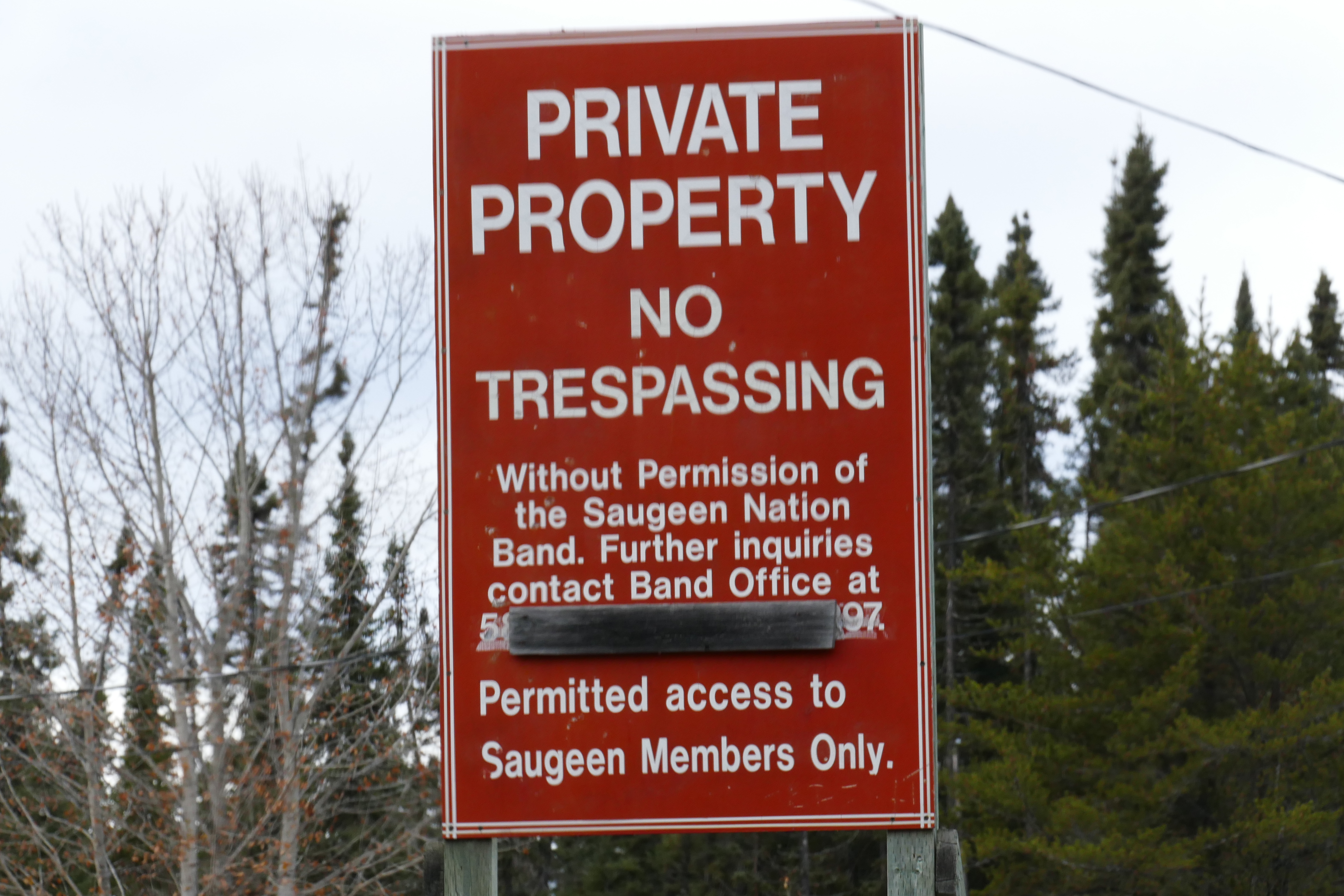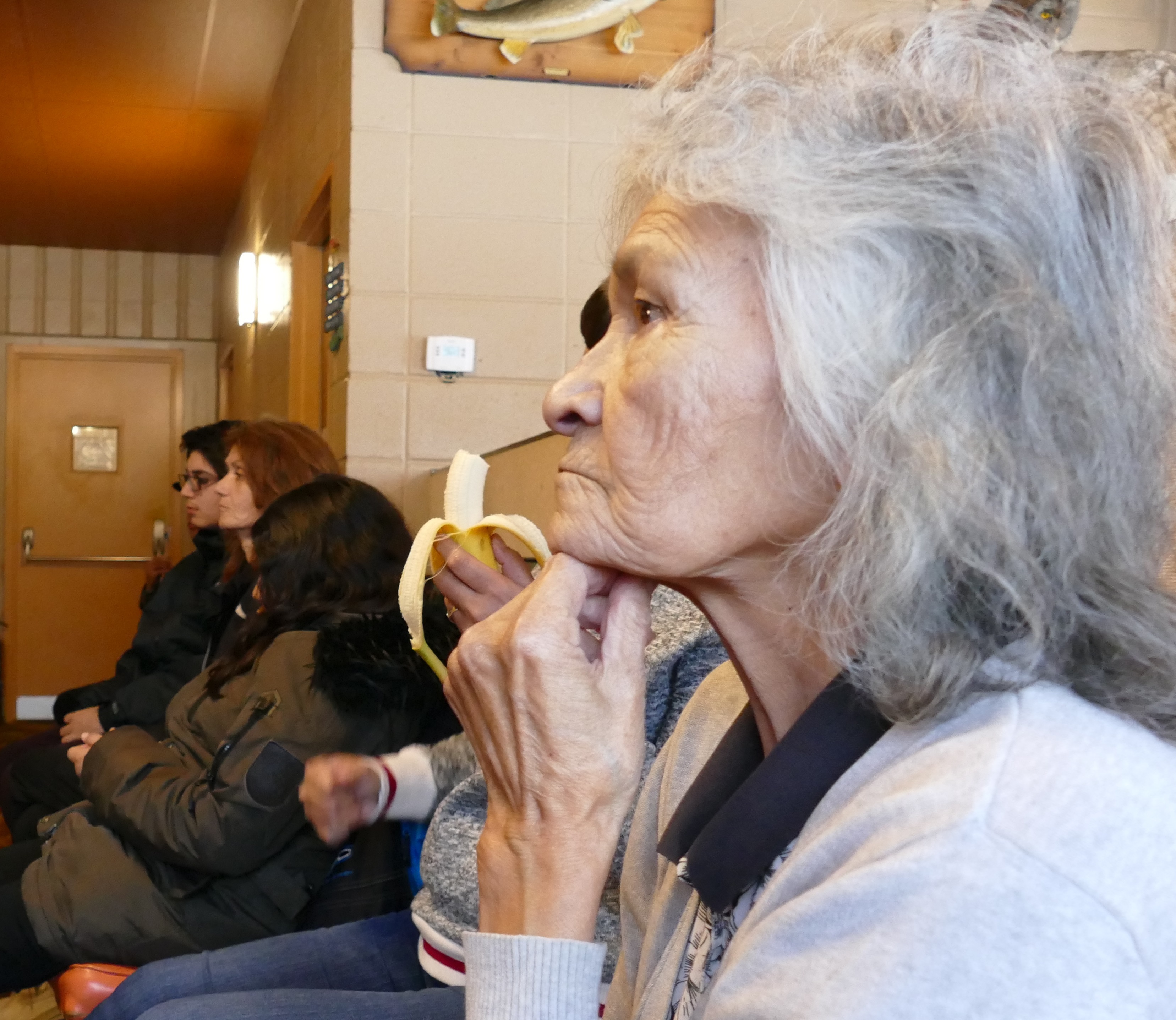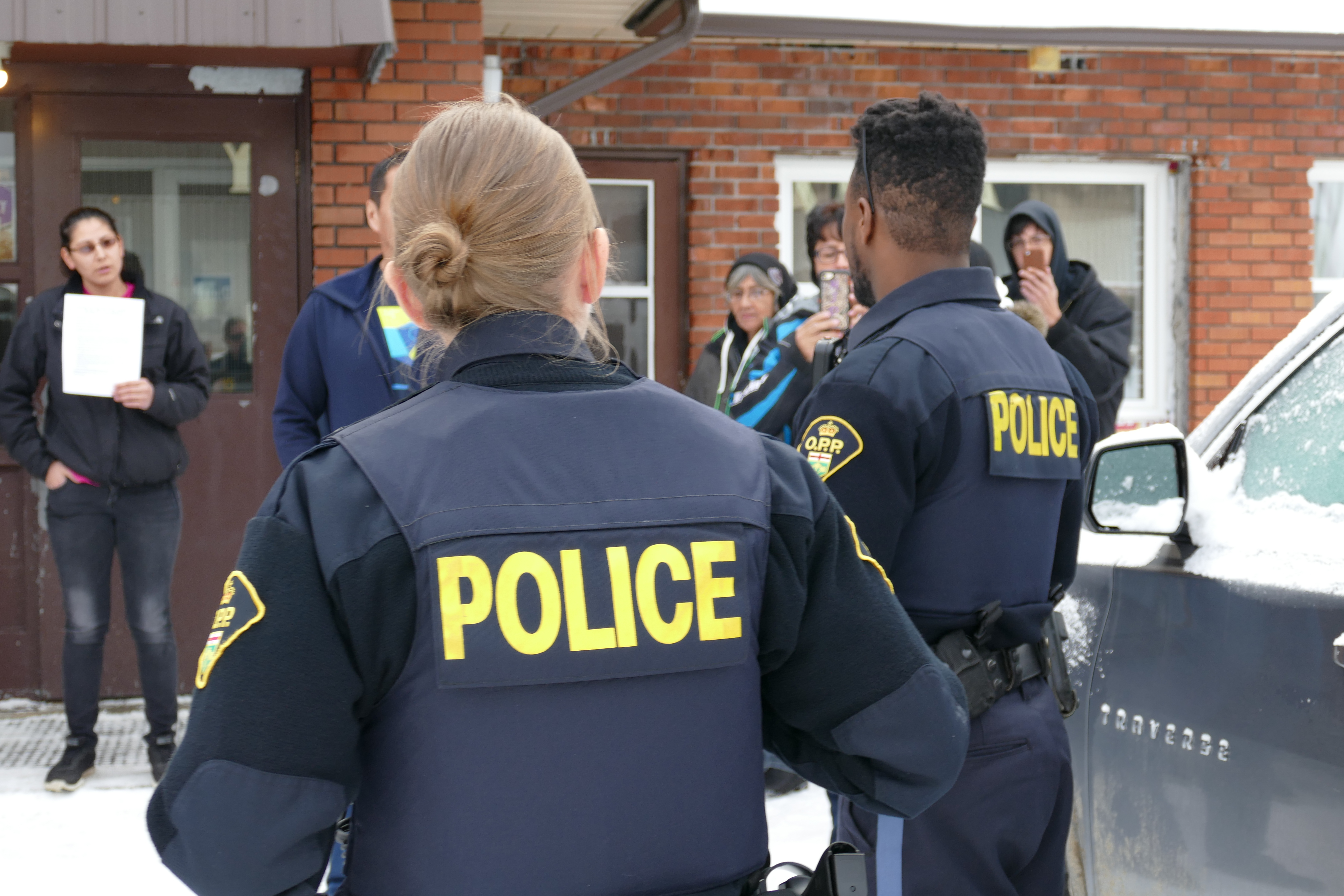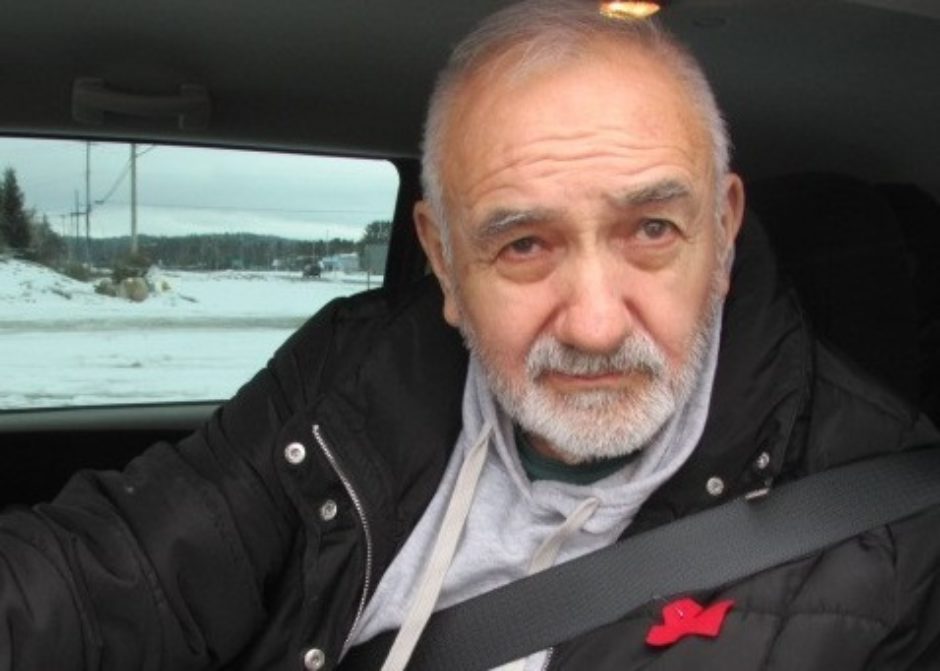February 2, 2019
Chief Edward Machimity said he was going to call the Ontario Provincial Police if the reporter didn't leave the Ojibway Nation of Saugeen reserve within 30 minutes.
Chief Machimity and his son, Marvin Machimity, had pulled up in a pickup truck outside Betty Necan’s home after getting a tip there was a CBC News reporter inside.
"I am the chief. I didn't call you," said Chief Machimity, seated on the passenger’s side with the window down.
"If I call you, then you can come," he told the reporter.
Saugeen is a remote community located 400 kilometres north of Thunder Bay. For years, members of the band have complained that the chief and his handpicked councillors, known as headmen, and band officials rule the reserve with an iron fist and for their own benefit.
The chief has been in power for 33 years and many in the community say they are fed up.
But his grip on power is tight.
His daughter is one of his headmen, and so is his best friend. His wife is the band manager, and his son is the cultural director. His son-in-law is chief of the two-member band police service.
Sitting behind the wheel of the idling pickup, the chief’s son, Marvin, says all the negative talk is just lies and rumours meant to discredit his father.
He says jealousy is driving his father’s opponents.
"They want to get the chief out because they are seeing the success of the leadership," he said.
"There is going to be no election until I die."
Saugeen is part of Treaty 3, which was signed with the Canadian government in 1873. Marvin says people from the community have no idea what’s actually in the treaty, which leads them to make irrational demands of the band.
"This generation knows nothing about the treaty," he said. "They want to get money, free."
Chief Machimity also mentioned the “treaty issue” during his 18-minute exchange with CBC News.
When asked what sort of arrangement he has with forestry companies logging on his community's treaty territory, the chief said he had none. He said the forestry companies give his contracting company logging contracts.
"I am under custom usage, the Indian way of life," he said.
"I have been a contractor for the last 30 years."
The chief made it clear the revenues from the logging contracts with his company go directly to him.
"Where do they go?" he said. "In my pocket."
Machimity, who is in his late 70s, said he'll remain chief until his last breath.
"I am lifetime chief," he said.
"There is going to be no election until I die."

Chief for life
Founded in the mid-1980s, Saugeen is a small community, with a total band membership of 242 people, about 100 of whom live on the reserve. Its reserve lands, which total about 60 square kilometres, were established in 1990.
It is one of 358 First Nations that operate under what’s known as a custom election code. Under Section 11 of the Indian Act, a band can create its own system to select its leadership.
Bands with hereditary leadership selected under the Indian Act section on custom codes are rare. The one other high-profile example of a chief for life is in Buffalo Point First Nation, about 200 kilometres southeast of Winnipeg. The chief there, John Thunder, inherited the position from his father.
Edward Machimity became Saugeen’s first chief in 1985, after Gilbert Machimity, head of one of the community’s founding families, appointed him to the post.
Paul Machimity, Gilbert Machimity’s 49-year-old-son, said Edward had the support of the community after it broke away from Lac Seul First Nation and formed its own band.
Paul said he doesn't believe there were any formal elections held between Edward's appointment as chief in 1985 and the creation of the custom leadership selection code that installed him as lifetime chief 12 years later.
"People just went along," he said.
It seems Chief Machimity got the idea for the customized process, known as the Custom and Usage Convention, from two men from Onion Lake, a Cree nation in Saskatchewan.
The men were known as “treaty technicians,” according to community member Betty Necan, 47, who met with the pair at the time.
"People just went along."
She said the men developed the convention along with Chief Machimity and his family. It was presented to the community as a finished product during a meeting at the school in 1997 and officially adopted, she said.
A band document on the custom code said it was ratified by "the original families as represented by Edward Machimity, Gilbert Machimity and David Necan."
Gilbert Machimity and David Necan have since died.
John Mahimity, who is Chief Machimity's brother, said in the beginning the community supported his brother's leadership.
However, over time, his brother began to exclude the community and grew intolerant of opposition, said John Machimity.
In a phone interview Wednesday, he said a band police officer showed up at his door to deliver a letter from his brother and two of the three headmen demanding he cease organizing to replace his brother and council.
This wasn't the first time the band police had been used for political purposes.
In May 2016, Chief Machimity sent a memo to Durell Keesic, his son-in-law and chief of the band police, requesting he investigate Hilda DeRose after she shared a post on Facebook about a meeting to replace the band's leadership.

In the memo, the chief said he wanted to pass a band council resolution "where chief and council will take action" against individuals who call band meetings without authorization.
The memo doesn't specify what type of action Machimity had in mind.
DeRose said the police chief handed her the memo as a warning during a community meeting held by a group of women who wanted to oust Chief Machimity by simply declaring his mandate had been revoked.
"They just do what they want."
"I was taken aback by it, shocked by it," DeRose, who now lives in Hudson, Ont., said in an interview with CBC.
"We haven't been treated fairly for 21 years. They just do what they want."
After the meeting in May 2016, the women sent a letter to Indigenous Affairs Minister Carolyn Bennett, informing her that Edward Machimity was no longer chief.
The department wrote back two months later saying the minister had "no legislative authority" to intervene and that the department would continue to recognize Edward Machimity as chief until it was "formally notified that an election has occurred."

Ottawa rarely intervenes in custom code leadership disputes, no matter how many letters the membership sends.
The last time Ottawa did so was back in August 2010, when Conservative Aboriginal Affairs Minister Chuck Strahl invoked Section 74 of the Indian Act to terminate the leadership of the Algonquins of Barriere Lake, a First Nation in Quebec, located about 300 kilometres north of Ottawa.
Barriere Lake used a traditional mode of leadership selection known as blazing, where the elders choose the chief and the community then gathers and either approves or rejects their choice.
The federal government argued that Barriere Lake faced intractable and long-standing leadership conflicts that were affecting the delivery of services to the community.
The government forced the community to hold an election under the Indian Act election code.
In her 2017 book, Grounded Authority: The Algonquins of Barriere Lake Against the State, Shiri Pasternak, research director of Ryerson University’s Yellowhead Institute, argued the move was a politically motivated coup d’etat.
She described it as an "exit strategy" for Ottawa to avoid implementing an agreement signed in 1993 that gave the Algonquin community, which never signed a treaty, control over its claimed traditional territory.
The 21-year review

While past attempts to change Saugeen’s leadership had been unsuccessful, a meeting on Dec. 9, 2018, at the Four Winds Motel in Savant Lake, Ont., about 20 kilometres south of the reserve, was different in one key respect.
It was held on the 21st anniversary of the custom election code.
According to the code, the chief was to undergo a leadership review every 21 years. Opposition band members believed this was their best shot at replacing the chief and his council.
"A review to the conduct of the customary chief and headmen will be in a form of an open discussion," the code says.
It says the outcome of the discussion would be the "final decision."
One by one, about 30 people, a mix of on- and off-reserve Saugeen members, gathered around tables in the motel’s dining room and listed all the reasons they wanted to replace their chief.
The chief and his daughter, headman Eileen Keesic, did not attend.
Headmen John Sapay and Gladys Ombash were there, but did not speak much during the meeting.
The group decided to create a shadow government, called a unit body, which would create a new selection process for the chief within the parameters of the band’s custom code. The process was set to be finalized for a Feb. 3 meeting at the motel.
Their reasons for wanting change boiled down to a belief their band government only operates for the benefit of a few and punishes those it views as potential threats to the status quo.
For example, they spoke of the alleged misuse of the band's medical vans. They say the drivers are never around to take anyone for appointments in Sioux Lookout or Thunder Bay.
"Nobody is allowed to go on the medical vans, only them," said Desiree Jacko, 27, an educational assistant who lives on-reserve but works in Sioux Lookout.
Betty Necan said the band doesn't even help out with funerals.
"Our life is hell. Why can't they at least bury us nice if they're not going to treat us good," she said. "Buy us a frickin' coffin or take us to the dump; it's at least a ride."
The band members said they also had no idea what their band council is up to or how it spends the community's money. They say they have repeatedly asked but are never given access to the band’s books.
Saugeen was put into third-party management in March 2008 because the band had refused to sign a funding agreement with the federal government, arguing their treaty was the only contract they needed.
The band was put into co-management in 2011, with an outside accounting firm helping to oversee their spending. Saugeen was removed from co-management in 2015 and currently runs its own financial affairs.
Chief Machimity was initially chosen by community elders to lead the band because he was seen as a fighter for treaty rights, said his brother John Machimity.
But that eventually changed, he said.
"Our leader is a servant to the people or is he a servant to himself?"
Darlene Necan, the longtime spokesperson for the band council opposition, says the chief and the council are "not well."
"I think it's time for them to step down."

Gladys Ombash, 79, Betty Necan’s mother and one of the three headmen, says even though she sits on council she's been kept out of the loop on the band’s activities and spending for about two years.
"They never tell me nothing," she said. "They don't have no respect for older people."
She wants to step down and let her daughter take her place.
During the meeting at the Four Winds Motel, Doug Keshen of Kenora, Ont., the band's longtime lawyer, came to the chief's defence.
He said the chief couldn't attend because of diabetes-related health problems, including having to prepare for the amputation of one of his legs.

Keshen said Saugeen is unique in Canada because it operates under a custom governance code — it's not unique — and warned that changing leadership could somehow jeopardize Saugeen’s freedom to govern itself.
"Be very careful," he told the meeting. "Be very careful because there are so many First Nations in Canada that would love to have a custom and usage convention of this order that allows the people to not be subject to the provisions of the Indian Act, to not be subject to what the minister dictates for First Nations."
Like the other 357 First Nations with a custom election code, Saugeen is still subject to the Indian Act.
Keshen also warned the chief's opponents that changing leadership could jeopardize a deal that would see Saugeen sign on to Wataynikaneyap Power, the First Nations-led infrastructure project to build an 1,800-kilometre electrical transmission line connecting 17 remote First Nations to Ontario’s grid.
The project crosses about 300 kilometres of Saugeen’'s traditional territory, which would result in compensation for families with traplines in the corridor, Keshen said.
Five weeks later, on Jan. 17, Wataynikaneyap Power announced Saugeen had signed on to the project, which includes 23 other First Nations.
Keshen told the members gathered at the Four Winds Motel that Chief Machimity always has the community's interests and rights in mind with every decision he makes.
"He has fought the best he can and now his health isn't good," Keshen said.
"Then it's time for him to go down," Betty Necan replied.

At one point, two Ontario Provincial Police officers showed up at the meeting, much to the surprise of the chief's opponents.
The two officers, based out of Ignace, Ont., said they were told by a sergeant in Thunder Bay that there was a call about a "mock election."
The officers said they were ordered to travel the 130 kilometres from their detachment to investigate.
They said they did not know who placed the call, but John Machimity said he believed it came from his brother, the chief.
"It shows you what kind of leadership we are under," he told the gathering.
The OPP officers were briefly allowed into the meeting. One of them asked questions about the reason for the gathering and the group's plans.
"We're not here as intimidation, to strong-arm or make anyone think anything," the officer said. "You all seem pretty co-operative and good, and no one is out to lunch."
Then a woman piped up: "What if we decided to have a blockade?"
The officer said the OPP should probably be informed in advance.
"If you go ahead and block a road, then the results might not be OK," he said.
The officers spoke with the group for about 13 minutes before leaving.
Let's make a deal
On Jan. 23, Keshen called Darlene Necan to propose a deal.
According to a recording of the call, played for CBC News, Keshen offered to help Necan and opposition community members to create their own reserve.
He also said the band would buy the Four Winds Motel, which is for sale, and Necan and other members of her group could then buy it with trapline compensation money they're expecting from the Wataynikaneyap electric project.
In exchange, Keshen said, the Feb. 3 meeting would be cancelled and rescheduled for June.
Necan said the meeting would not be cancelled.
"We are going ahead anyway and see what the people want to do," she said in a phone interview.
"They are very determined that they want change."
At the Feb. 3 meeting, the group selected four new headmen and began laying the groundwork to begin the selection of a new chief.
